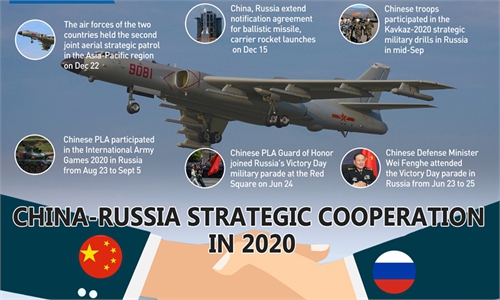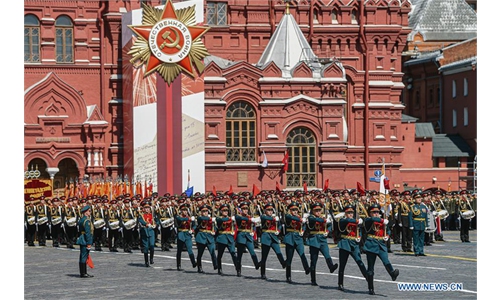
Illustration: Liu Rui/GT
The air forces of China and Russia held their second joint aerial strategic patrol on Tuesday. The People's Liberation Army sent four H-6K bombers to form a joint formation with two Tu-95 bombers from Russia to conduct the patrol in the relevant airspace over the Sea of Japan and the East China Sea. The US and its Asia-Pacific allies and some Westerners attached great attention to the joint patrol. We believe that the reason for such attention is China and Russia have conducted too few joint exercises in the past - the two armies should further normalize similar joint operations.
The US has many allies in the Asia-Pacific region. Within the global alliance network headed by the US, it is as normal as having lunch for allied countries to conduct joint military drills. They arrogantly think they can do anything they want, but they believe close military interactions between China and Russia will possibly pose a "threat." Such mentality is quite harmful.
China and Russia are comprehensive strategic partners of coordination for a new era. A simple interpretation of the two countries' comprehensive coordination is "to be partners but not allies." This meets the two countries' fundamental interests, and is also important to secure global strategic balance. The US' increasingly wilder unilateralism and its escalating unscrupulous suppression of China and Russia have made such coordination between China and Russia more valuable and urgent.
The US' unilateralist blueprint is most destructive to the stability in the Asia-Pacific region and even the world. In recent years when people talk about the risk of military confrontations, the US is regarded as either a protagonist or a role that steers the situation from behind the curtain. The US has pointed the gun at China and Russia, rather than on a specific possibility of escalating disputes. We can see the goal of US actions in its so-called Indo-Pacific region and Europe is not to maintain peace, but to contain China and Russia.
The US way of pressuring has sabotaged the principle of multilateralism and the basic norms of international relations. Its essence is to strengthen hegemony, which will inevitably lead to tensions between major powers and impact international order. Some countries, roped in by the US, have intensified their disputes with China and Russia.
China and Russia have no intention of forming a military alliance because it cannot resolve the comprehensive challenges the two countries have to face. A military alliance will have a negative impact on the two countries' interests at this stage. But it is a general trend for China and Russia to strengthen comprehensive strategic cooperation, including military cooperation. The joint pressure exerted by the US and its major allies has provided an important external impetus to this trend.
The China-Russia comprehensive strategic partnership of coordination for a new era is very strong. The two countries are major powers in comprehensive strength. As long as they cooperate strategically and jointly deal with challenges, they can generate effective deterrent, form a joint force to deal with specific problems, resist the attempts to suppress the two countries and curb the US' international misconduct. The latest China-Russia partnership has become a protective screen for the international community to maintain fairness and justice.
The China-Russia comprehensive coordination is strategically defensive. It does not aim at expansion, but is an internal mechanism that helps the two countries maintain their strategic interests and strengthen their security. The two countries will not show off this partnership and chase unequal relations with a third party.
China and Russia do not want to see a divided world or a world featured by different military groups, which is what Washington advocates. The US alliance system is the legacy of the Cold War which should gradually quit the world stage. But what has happened is just the opposite - the military alliance network with the US at the center is gaining momentum in the Asia-Pacific region. At this critical juncture, China and Russia have made efforts to maintain their partnership rather than form an alliance, which should be viewed as responsible moves for world peace.
Washington should be clear that it should refrain from its hegemonic ambitions. The world's definition of fairness and justice should not be held hostage by the US. Washington is not the judge. China and Russia are prone to reason and are willing to abide by rules, but they deeply know that national strength is the backbone of reason. Cooperation between China and Russia can better correct the negative impact of US hegemony. The bossier the US is, the more resolutely China and Russia will coordinate.



